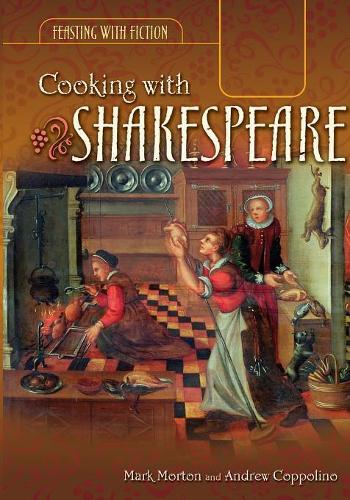
Cooking with Shakespeare
Publishing Details
Cooking with Shakespeare
By (Author) Mark Morton
By (author) Andrew Coppolino
Bloomsbury Publishing PLC
Greenwood Press
30th March 2008
United States
Classifications
General
Non Fiction
Literary studies: plays and playwrights
Literary studies: c 1600 to c 1800
641.5942
Physical Properties
336
Width 178mm, Height 254mm
851g
Description
Feasts, banquets, and everyday meals were central to daily life in Elizabethan England, a world reflected so lavishly in Shakespeare's plays. This book helps students and general readers learn more about Shakespeare's food culture. An introductory essay discusses the culinary customs of Shakespeare's era. This is followed by more than 180 recipes from Elizabethan times. Recipes are grouped in chapters according to types of food and are accompanied by modernized versions for today's chefs. Passages from Shakespeare's plays relate the recipes to his texts and help students use food to gain a greater appreciation of his world and works.
An introductory essay discusses food in Elizabethan society. This is followed by the heart of the book, a collection of more than 180 recipes from Shakespeare's world. Recipes are grouped in chapters on particular types of food, such as fish and seafood, pork, vegetables, beef and veal, and beverages, and are accompanied by modernized versions for contemporary cooks. Passages from the plays relate the recipes to Shakespeare's works and help students understand both his plays and the world in which he lived. The volume closes with a list of hard to find ingredients, a chart of wages and prices from Shakespeare's day, sample menus, a glossary, and a bibliography of period cookbooks, secondary works, and electronic resources.
Reviews
This book ventures beyond literature and cookery into history, etymology, and sciences.Thorough, exemplary, logical, and unflinchingly authentic, the volume is a labor of love and thoughtful scholarship. Offering 189 recipes (some delicious), the book features a 67-page introduction on period ideology, dietary theory, law, pharmacology, etiquette, and economics. There are four appendixes, including Hard to Find Ingredients (substitutions/sources for hyssop, isinglass, verjuice, etc.) and Wages and Prices.The recipes are irresistible to read, if not always to cook--baked porpoise, swan's-blood pudding, and an aphrodisiac tart with sparrows' brains (the authors suggest substituting a teaspoon of Spam). In the fully quoted and cited original recipes, the authors note details that might escape readers' attention, e.g., carving breast meat from a live chicken.This wonderful book joins such titles as Francine Segan's Shakespeare's Kitchen: Renaissance Recipes for the Contemporary Cook (2003). Highly Recommended. * Choice *
A rich, fun survey of early cooking methods and recipes for modern readers and librarians interested in culinary history. * Midwest Book Review *
Cooking with Shakespeare is packed with information that will interest culinary historians, lovers of Shakespeare, and foodies alike. * Gastronomica *
The introduction outlines the material and ideological conditions surrounding the production and consumption of food in Shakespeare's time. Each of the 189 entries couples a recipe taken from an early modern source with a related reference in Shakespeare, a short discussion of important terms in the recipe or quotation, and a translation of the recipe into modern terms.Bon appetit. * Studies in English Literature *
Cooking with Shakespeare should set a new standard for cookbooks about food and cookery of 16th-century England.Cooking with Shakespeare should satisfy almost everyone with an appetite for the subject. * Repast *
Author Bio
MARK MORTON is Senior Instructional Developer (Technology) in the Centre for Teaching Excellence at the University of Waterloo. Previously, he taught courses in Shakespeare, Modern Drama, and Creative Writing at the University of Winnipeg. His other books include Cupboard Love: A Dictionary of Culinary Curiosities (1996), The End: Closing Words for a Millennium (1999), and The Lover's Tongue: A Merry Romp through the Language of Love and Sex (2003). Mark also writes a quarterly column for Gastronomica: A Journal of Food and Culture, and has written and broadcast more than a hundred columns about language for CBC Radio.
ANDREW COPPOLINO is a freelance writer, restaurant reviewer, and newspaper columnist with a special interest in food writing. He has published in Restaurant Report, Culinary Trends, Whisky Magazine, CityFood Magazine, Gremolata, and Canadian Gaming Business, as well as a number of food and lifestyle magazines.
